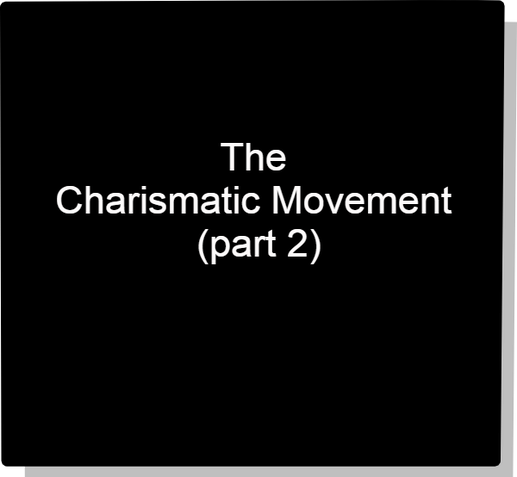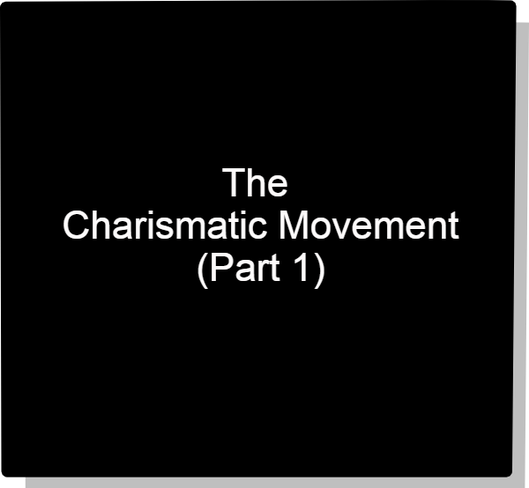Before we start talking about the individual aspects of the Charismatic Movement, I want to start by explaining some of the things that led up to this movement becoming so popular. To begin with, let's simply consider the history of human nature. All of the desires mentioned above naturally appeal to our human flesh and there is nothing new under the sun (Ecclesiastes 1:9). Therefore we can expect to find some of these thoughts all throughout history to some degree. Really, we even see it in Paul’s day. There were men who were seeking the supernatural power of the Holy Spirit (Acts 8:14-24)
But in more recent history, the Charismatic movement began with the “Holiness Movement.”
From Wikipedia:
“Pentecostalism emerged in the early 20th century among radical adherents of the Holiness movement who were energized by revivalism and expectation for the imminent Second Coming of Christ. Believing that they were living in the end times, they expected God to spiritually renew the Christian Church thereby bringing to pass the restoration of spiritual gifts and the evangelization of the world.”
The main doctrinal beliefs of the Holiness movement largely came from the influence of Methodism (John Westly), and also (to a lesser degree) the Anabaptists. But this idea of "revivalism" inspired some to desire to be back in the “Apostolic Age.” People wanted to be able to practice the supernatural things they read about the apostles doing.
But we will skip forward through history to 1900. During this time, the teachings of Charles F. Parham (although not very popular) began to slowly spread (he was based in Topeka, KS). Parham’s beliefs included speaking in tongues as a sign of “Spirit baptism.” Soon, several young, African Americans were influence by Parham’s teachings, including a man named William J. Seymour
Considering the fact that America had seen a century or so of “snake_ oil _salesmen,” it makes sense that this would carried over into the spiritual realm as well. It is worth noting that during this time many cults were springing up. And people were looking for something "new."
Well, eventually Parham was arrested for the accusation that he was practicing homosexuality, but later the charges were dropped without enough evidence to prove it. These allegations caused a lot of persecution among Parham’s followers, and eventually William Seymour rose as a leader among the group.
Seymour eventually led in a 3-year long revival on Azusa Street in Los Angeles that became known as “the Azusa Street Revival”
This revival began in a small house in a very poor town.
From Wikipedia:
“Seymour and his small group of new followers soon relocated to the home of Richard and Ruth Asberry at 216 North Bonnie Brae Street. White families from local holiness churches began to attend as well. The group would get together regularly and pray to receive the baptism of the Holy Spirit. On April 9, 1906, after five weeks of Seymour's preaching and prayer, and three days into an intended 10-day fast, Edward S. Lee spoke in tongues for the first time. At the next meeting, Seymour shared Lee's testimony and preached a sermon on Acts 2:4 and soon six others began to speak in tongues as well, including Jennie Moore, who would later become Seymour's wife. A few days later, on April 12, Seymour spoke in tongues for the first time after praying all night long.
News of the events at North Bonnie Brae St. quickly circulated among the African American, Latino and White residents of the city, and for several nights, various speakers would preach to the crowds of curious and interested onlookers from the front porch of the Asberry home. Members of the audience included people from a broad spectrum of income levels and religious backgrounds. Hutchins eventually spoke in tongues as her whole congregation began to attend the meetings. Soon the crowds became very large and were full of people speaking in tongues, shouting, singing and moaning. Finally, the front porch collapsed, forcing the group to begin looking for a new meeting place. A resident of the neighborhood described the happenings at 216 North Bonnie Brae with the following words:
They shouted three days and three nights. It was Easter season. The people came from everywhere. By the next morning there was no way of getting near the house. As people came in they would fall under God's power; and the whole city was stirred. They shouted until the foundation of the house gave way, but no one was hurt.”
This meeting was then moved to Azusa Street where the meeting continued. Today, different groups will point to this revival as the start of their movement (typically called Pentecostalism), but, as we saw in the last lesson, the Charismatic movement spread to many groups that would not necessarily call themselves Pentecostal in doctrine. This was the start of what is called the "first wave" of the Charismatic movement.
In the next lesson we will talk about all "three waves" of the Charismatic movement.



 RSS Feed
RSS Feed

